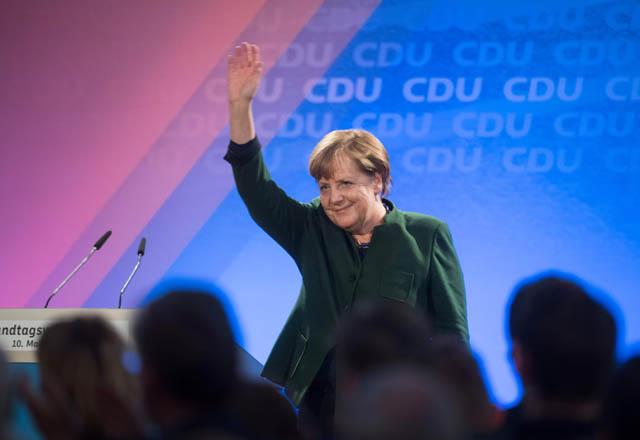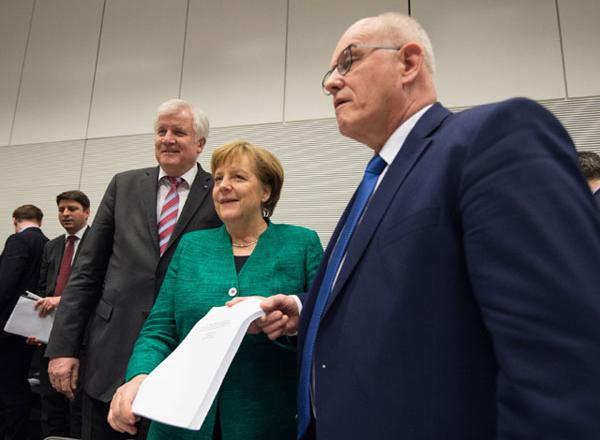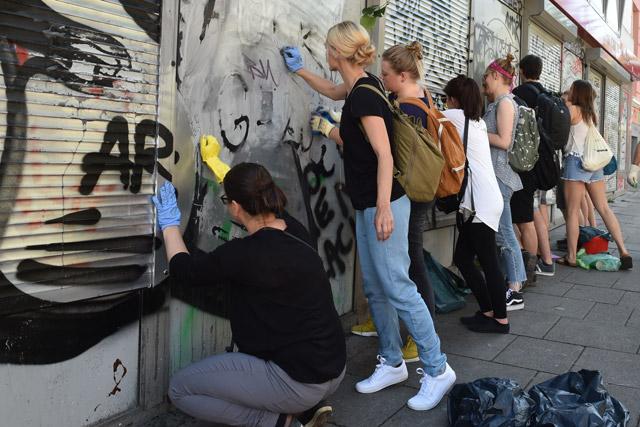You are here
Merkel’s party faces election dry run in bellwether state
By AFP - May 11,2017 - Last updated at May 11,2017

German Chancellor Angela Merkel waves at an election rally in Brilon, western Germany, on Wednesday (AFP photo)
HALTERN AM SEE, Germany — Germany's most populous state goes to the polls on Sunday, with Chancellor Angela Merkel's party aiming to extend a winning streak that could seriously damage her rival before national elections.
One in five German voters — 13.1 million — will cast ballots in North Rhine-Westphalia (NRW), a sprawling industrial region with a big migrant population which has been a Social Democratic Party (SPD) stronghold for 17 years.
But surveys show the centre-left party running neck and neck with Merkel's Christian Democratic Union (CDU), with the latest published, on Thursday even putting it behind the CDU, adding to indications that initial enthusiasm for new SPD leader Martin Schulz could be fizzling out.
The SPD had been ailing nationwide but saw a surge in support in February when Schulz took over. That, however, failed to translate into votes in the last two state elections, when the SPD took a hammering and the CDU won comfortably.
"In a region where the SPD should be leading the CDU by 10 points, even if we tied with the party, it would already be a clear signal before the general elections, showing that the Schulz effect is over," said Wolfgang Partfoerder, 67, a former CDU mayor.
Nationwide, the SPD is also struggling to close the gap, polling says. The party is now banking its hopes on incumbent NRW state premier Hannelore Kraft, 55.
"If Kraft succeeds, then the chances of the SPD's bid to take back the chancellery grow. If she loses, it would mean that the Schulz train has slammed against a wall," said Spiegel weekly.
Political analyst Oskar Niedermayer also noted NRW's significance to the SPD, saying "a defeat there would be a disastrous symbol" for the party.
With much at stake four months before national elections, both Merkel and Schulz are pounding the streets in NRW where 18 million people live, including 4.2 million of migrant origin.
Speaking in the town of Haltern am See, Merkel urged voters to look at her government's economic record, noting that NRW, with 7.5 per cent unemployment, lags behind the national rate of 5.8 per cent.
"Through intelligent policies and solid finances, and by doubling our investments in research, we have managed to reduce the number of jobless people to half that in 2005 when I became chancellor," she said, campaigning for CDU candidate Armin Laschet.
Schulz touts SPD record
Mindful that local issues can tip the balance in regional elections, Merkel has also criticised the incumbents for "persistent traffic jams... costing commuters in NRW time that they could well use in other ways".
Schulz joins Kraft on Thursday in Leverkusen, Aachen and his hometown Wuerselen.
But even a win may not suffice for the SPD, as the score would be measured against its 2012 polling of 39.1 per cent. The CDU at that time clinched just over 26 per cent.
SPD supporter Guenter Kadelka, 63, said he still hopes his party will prevail, even though "the Schulz surge has faded. We don't hear about it anymore".
Schulz is talking up Kraft's record, saying NRW boasts "the lowest number of unemployed in 23 years, a budget surplus for the first time in 43 years, leads Germany in terms of social housing built and is a trailblazer against tax evasion".
But the SPD-led state — it governs in coalition with the Greens — has also come under attack over its security record.
State Interior Minister Ralf Jaeger has faced criticism for failing to detain Anis Amri before the Tunisian asylum seeker's deadly Berlin Christmas market rampage last year.
Amri had lived in the state and was deemed a threat by intelligence officials, but Jaeger argued that there was insufficient evidence to lock him up.
On Jaeger's watch, Cologne also became the scene of mass sexual assaults by groups of mostly North African men on New Year's Eve of 2015-2016.
The mass groping of women inflamed the debate over the 890,000 asylum seekers Germany took in in 2015, and Cologne police came under fire for failing to halt the attacks.
Related Articles
BERLIN — German Chancellor Angela Merkel's conservatives and the Social Democratic Party (SPD) sealed a deal on a new coalition on Wednesday
BERLIN — A blame game over ugly street violence that marred Germany's hosting of the G-20 summit last week spilled into the national electio
STUTTGART, Germany — German Chancellor Angela Merkel's conservative party suffered heavy losses in two key regional elections Sunday, early


















